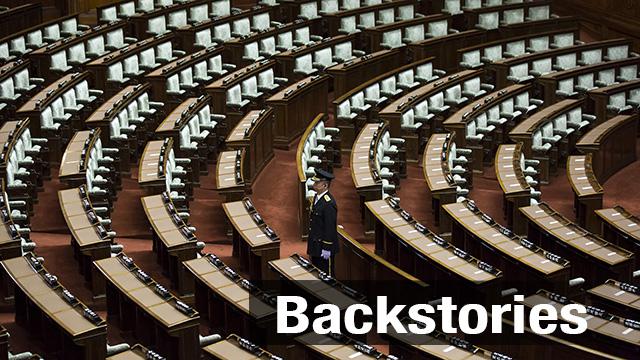Background
- This is the first diet session since Prime Minister Abe's reelection for a third term as leader of the ruling LDP and his cabinet reshuffle.
- Okinawa recently held a gubernatorial election, and the candidate backed by the ruling coalition lost.
- The Upper House election is less than a year away, and opposition parties have intensified their criticism of the government.
Japan’s Diet has three kinds of sessions. The ordinary session usually starts in January and lasts 150 days. An extraordinary session can be requested by the cabinet or by a quarter of the members of either house. A special session is opened after a Lower House election to nominate the prime minister.
The government called the coming extraordinary session from October 24th to December 10th.

Focus 1: Supplementary budget
The government plans to enact a supplementary budget of 940 billion yen, about $8.34 billion. It will be used primarily for recovery efforts following a spate of recent natural disasters, including July's torrential rain in western Japan and September's strong earthquake in Hokkaido.
Abe told LDP executives on Tuesday that he intends to make an all-out effort to have the bill passed quickly to rebuild peoples' lives.
- Experts: Mega-quake Can Occur Anywhere in Japan
- Flooding Reveals Risks at Kansai Airport
- Graphic Visualization of Japan's Rain Disaster
Focus 2: Change in foreign worker policy
The Abe government aims to change Japan's foreign worker policy, creating a new visa status. It will be a drastic shift for a country known for its strict immigration rules.
The visa status will have two levels of qualifications. The first allows foreign workers to stay in Japan for up to 5 years if they pass technical skill exams and have sufficient Japanese language ability. However, they are not allowed to be accompanied by family. The second allows family for an indefinite period but has a harder exam and requires more advanced skills.
The reason for this change in policy is a serious labor shortage. The government is planning to accept foreign workers in the 14 most severely affected industries, including agriculture, fisheries, and construction. They say they want to decide which industries by the end of the year.

The opposition parties are demanding enough time to discuss the policy and implement support systems for foreign workers. Even some in the LDP on Monday expressed reservations about proceeding with the visa before they have decided on the 14 industries.
The government wants to introduce the new visa next April.
- Foreigners Bring Youth to Japan's Aging Populace
- Opening the door to incoming workers
Focus 3: Consumption tax hike
Abe has expressed his intention to proceed with a consumption tax hike on October 1st, 2019. The rate will be raised from the current 8 to 10 percent. The government plans to keep the rate at 8 percent for groceries and other staples. If this happens, it will be the first time the country has had more than one consumption tax rate.
Opposition parties are generally united in their stance against the hike. Some cite the current economic situation in the world and country. One party is against the idea of introducing different rates.
Abe has already postponed the hike twice, both before national elections. The Upper House election is scheduled for next summer, and Abe will be asked during the session whether he plans to push back the hike yet again.
- The Dilemmas Facing Abenomics
- Learning From the Past: Minimizing the Impact of Japan’s Next Consumption Tax Hike
- BOJ's Long and Winding Road
Focus 4: Political scandals
The Abe government has been dogged by two major scandals for over a year. One involves allegations of the preferential treatment of a friend of Abe's who opened a veterinary school with government approval. Another is the Finance Ministry's falsification and discarding of documents related to a controversial land deal with a private school operator, who was an Abe supporter.
Several opposition parties have pointed out that these scandals have yet to be resolved. The biggest, the Constitutional Democratic Party, is ready to submit a new law during this Diet session that creates a new agency to manage public documents.
Focus 5: Japan-US relations
Japan and the US agreed last month to start discussing what they call a Trade Agreement on Goods, or TAG. Abe sought a multilateral agreement, but President Trump preferred a bilateral one. Some lawmakers are worried that negotiations may end in an unreasonable agreement signed under US pressure.
- Analysis on Japan-US Trade Talks
The Okinawa US military base issue is also expected to be discussed. The move of US Marine Corps Futenma Air Station has become a legal battle between Okinawa Prefecture and the Defense Ministry. The government wants to move it to a less populated district in Nago City as agreed upon with the US, while the new Okinawa governor has rejected this as it means the base remains in the prefecture.
North Korea will also be a topic of debate.
- Impact of Okinawa Election
- 7 Things You Should Know About Okinawan History Before the Gubernatorial Election
Focus 6: Constitution amendment

Abe has reiterated his wish to amend the Japanese constitution, focusing on Article 9. He wants it to include a definition of the existence of the Self-Defense Forces.
The LDP is planning to offer their amendment proposal to the Lower House constitution commission and wants discussion. The opposition parties, however, are against the change and demand a debate on revising the national referendum law before any amendments are considered. Abe needs two-thirds approval from both houses to proceed with any amendment, but even some in his own ruling coalition are uncertain, calling for the procedure to not be hurried. It remains to be seen whether the LDP will actually submit their proposal to the commission.

